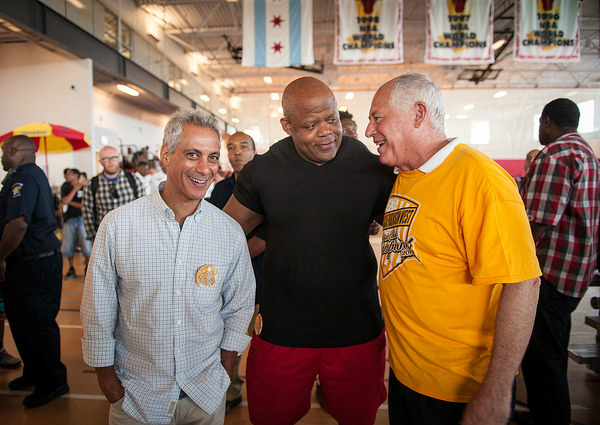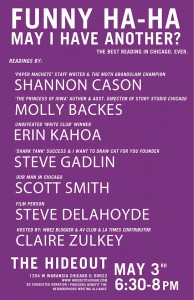 This is a piece I read for Tuesday Funk last night. It’s a reading series at Hopleaf on the first Tuesday of each month at 730pm. Last night was a particularly eclectic mix of poetry, fiction and non-fiction. Normally when I do a live reading, I favor something with some humor interspersed. This was the first time I ever read a piece without any of my usual tricks due, in part to developing this for both Tuesday Funk and an op-ed on the Sun-Times’s website. (The version that appears below is a little longer.) It was great to do something new in a live setting and to get this piece out there in a couple different forms.
This is a piece I read for Tuesday Funk last night. It’s a reading series at Hopleaf on the first Tuesday of each month at 730pm. Last night was a particularly eclectic mix of poetry, fiction and non-fiction. Normally when I do a live reading, I favor something with some humor interspersed. This was the first time I ever read a piece without any of my usual tricks due, in part to developing this for both Tuesday Funk and an op-ed on the Sun-Times’s website. (The version that appears below is a little longer.) It was great to do something new in a live setting and to get this piece out there in a couple different forms.
—
Over the Labor Day weekend, I was thinking about it means to do hard work. Hard work is filled with lots of little details that eventually pay off in the long-term, but aren’t much fun to hear about until you see the results.
I’d been thinking about what hard work looks like because of some news stories about Jaheim Benton and his South Side teammates from Jackie Robinson West, this year’s United States Little League champions. Benton scored five runs in the series, including the winning run in the championship game. In a month of news stories dominated by violence in African-American communities here in Chicago, in Ferguson, Missouri and elsewhere, the story of a group of young, inner-city black boys represented the pinnacle of American athletic accomplishment and contradicted an all-too-familiar narrative. This was a feel-good story on the scale of a big-screen movie, playing out in real life.
Just days after the team’s victory, the Sun-Times reported Benton, along with his mother and father, had been sleeping in the homes of friends and family for the past few months. They were homeless. Both parents work, but have been unable to pay their rent on two part-time salaries. Benton’s mother recently had her hours cut as an in-home care worker with Catholic Charities.
The story was a stunning contrast to the events of a few days before at a homecoming rally for Benton and his teammates at Millennium Park. Many of Chicago’s most powerful – the mayor, the governor, the State’s Attorney General and others – took the stage to praise the Jackie Robinson West team for its skill on the field. All were happy to celebrate the win and connect their names to a Chicago victory.
The question on the minds of many was whether any of the politicians who shared the stage with Benton earlier in the week would step up and be there for him now that his family needed help.
They didn’t. But the neighborhood did.
Leak and Sons Funeral Home offered to pay the family’s rent for a year. A South Side institution that has seen the effects of violence firsthand, Leak and Sons is no stranger to helping those in need, often providing discounted or pro bono funeral services to those who can’t otherwise afford it. In a story on ABC7 News, Spencer Leak Jr., said “I would hope that this rent turns into a mortgage that turns into homeownership for them,” said Leak Jr. In a separate Sun-Times story, he was quoted as saying “My dad always say a setback is a setup for a comeback. We’re going to try to help them come back.”
Other offers of assistance followed from various South Side businesses and institutions, including one from Leo High School in Auburn-Gresham, which offered Benton’s mother a job.
It’s easy to show up to a victory rally. It’s harder to show up when there’s lots of work to do and no cameras around. But the politicians were silent even though an offer of help would have been an easy win for them. Would it have been an obvious piece of political grandstanding? Sure. But no moreso than their appearance at the rally.
The reason they didn’t is simple: People in power only like to take credit for a win, not blame for a loss.
The South Side has seen plenty of loss in the last year. Twenty out of the 49 Chicago Public Schools were closed in this part of the city. It also sees a higher proportion of gun deaths and shootings. Many of these neighborhoods are starved for economic resources as well. These facts are all interrelated and help to explain why a family like Jaheim Benton’s would be homeless.
The politicians who shared in Jackie Robinson West’s win don’t want to acknowledge their part in preventing any of the above.
In the same way that electing one black man President doesn’t make racism go away, sending one South Side baseball team to the Little League World Series doesn’t alleviate the problems of poverty, violence and homelessness in the neighborhoods of Chicago. But it definitely shows what happens when you provide the right tools to combat them.
Jaheim Benton’s family has a solution now. But what about all those other families who are on the brink, but don’t have the benefit of a Little League World Series victory to bring attention to their plight? The young men of Jackie Robinson West either live in or live close to neighborhoods that make headlines due to gun violence. But they’re also supported by families, churches and schools. Their victory and the offers of help from Leak and Sons and Leo High School show what is possible when we stop thinking there are either “good” or “bad” neighborhoods.
The comments sections of our local news sites are replete with those who sneer at the notion that the 20 year old kid who was just arrested for shooting someone could be described by his mother as a “good kid.” But the distance between a good kid and a bad kid is short. Maybe only the distance between their home the nearest baseball field. And if we’re going to talk about the importance of baseball to the youth of Chicago, it’s worth talking about what happens to youth baseball when those cameras aren’t around.
In a piece for Substance News, George N. Schmidt notes that most Little League play isn’t affordable for kids in vulnerable neighborhoods. So this leaves baseball fields at the school or park district fields. The frequent rains this summer showed that most Park District fields weren’t maintained well enough to withstand the weather, with flooding a constant problem. As for the school fields, we’re back to those 20 closed South Side schools. If there’s no school, there’s no field. Schmidt also notes “Chicago’s public schools do not have frosh, and frosh-soph baseball programs because the funding to pay the coaches for these programs has been eliminated.” Nevermind all the other issues that plague Chicago’s youth: we haven’t even managed to invest in the very thing our city and state leaders just finished praising.
Even if the most celebrated young men in our city aren’t immune to the city’s larger problems, investment in their neighborhoods may be the key to solving them. Local businesses are present in a community for more than just the exchange of goods and services and public schools are a lynchpin of safety and stability for families with an uncertain home life. When we don’t work to create strong networks of both in our neighborhoods and instead save those tax dollars for downtown, we aren’t investing in our city’s long-term future.
This story is also a reminder that a systemic problem in any of Chicago’s neighborhoods – violence, poverty, failing schools or homelessness – is a problem in our own.
It’s something the politicians at Jackie Robinson West’s victory rally should remember, too: The victories of our youth come only when we take the steps necessary to prevent the losses. It’s hard work that starts long before anyone takes the stage.
Photo via Quinn For Illinois, CC License

